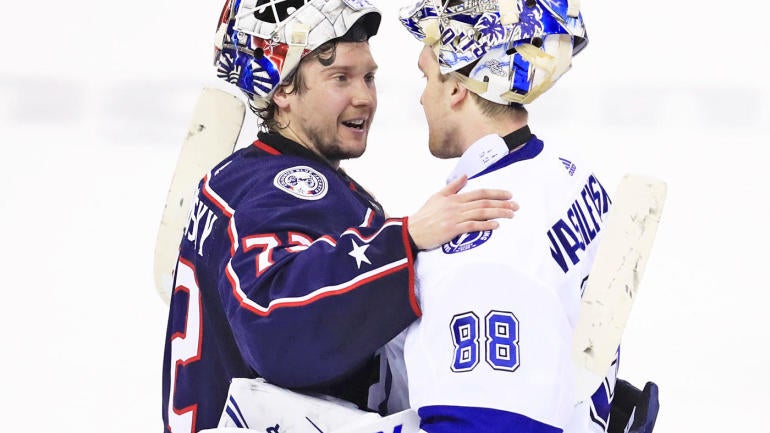2019-20 Fantasy Hockey: Goaltender Tiers
Not sure which goalies you should target in your Fantasy draft this season? Sasha Yodashkin is here to help with a tiered breakdown of this year's options.

Goalies are a unique Fantasy commodity, as they account for a completely different set of categories and often have much greater scoring variations when compared to skaters. While forwards or defensemen have a whole roster of alternatives to cover for any shortcomings, goaltenders can make or break your entire week with a clunker/shutout (or two). They're better equipped to fight off Father Time than skaters, but netminders can still fluctuate in value from year to year.
Breaking positions up into tiers is a useful tool for preventing panic picks when a draft inevitably goes through a run on goalies. Keep in mind that these rankings are designed for CBS head-to-head points leagues, which means maximizing playing time is more valuable than posting the best ratios. The guys at the top can obviously be counted upon for both, but this is an important distinction to remember once you get into the lower tiers. Players are listed by their ranking within the tier, so pick the earlier names when in doubt. Lastly, it's important to have a flexible approach once the season starts in order to avoid missing out on potential breakout players. Few Fantasy owners even knew who Jordan Binnington was at the beginning of last season, and he ended up carrying quite a few Fantasy teams to titles down the stretch before doing the same for the Blues.
Tier 1: Cornerstones
Andrei Vasilevskiy, Ben Bishop, Tuukka Rask, Frederik Andersen, Sergei Bobrovsky
These goaltenders are the cream of the crop, with the ability to deliver excellent cross-category production and a strong support system that can bail them out when they're off their game. Vasilevskiy was part of a historically good Lightning regular season in 2018-19, and there's little reason to believe he'll take a step back at age 25. Bishop was a finalist for the Vezina Trophy, which was won by Vasilevskiy last season, and Dallas loaded up with veterans this offseason in anticipation of another playoff run. Rask and Andersen are both high-end starters on loaded Atlantic Division clubs. Bobrovsky has the most question marks out of the options in this tier, but the two-time Vezina winner has a tremendous ceiling after winning 37 games for Columbus last season before leaving for a more offensively gifted Panthers club in free agency.
Tier 2: Cornerstones Lite
Braden Holtby, Connor Hellebuyck, Jordan Binnington, Marc-Andre Fleury, Carey Price
Holtby has averaged 39.4 wins over the past five seasons and Hellebuyck 39.0 over the last two. Both guys are coming off lackluster campaigns by their lofty standards but also have high floors and could easily match the production of the Tier 1 goalies if they bounce back. Binnington's regular-season resume consists of just 33 appearances (30 starts), but given his 1.91 GAA and .926 save percentage over that sample size and subsequent 16-win postseason to capture the Stanley Cup, it seems conservative if anything to only put him in the middle of the second tier. Fleury is 64-34-9 with a 2.40 GAA and .919 save percentage since joining the Golden Knights, and he should continue to serve as a workhorse for Vegas. Price came just two points short of carrying a mediocre Montreal team to the postseason last year, but it's hard to see him improving on his 35 wins from 2018-19 given his situation.
Tier 3: Wild cards
Pekka Rinne, Martin Jones, Matt Murray, Carter Hart, Robin Lehner, Semyon Varlamov
This is an eclectic tier of guys who have some red flags but could challenge the names above them if things break right. Rinne turns 37 in November and has a capable backup in Juuse Saros breathing down his neck, so the veteran Finn is unlikely to shoulder a massive workload for a contending Predators team. Jones won 36 games despite posting a career-worst 2.94 GAA last season, but he has a 2.47 career mark and is the clear-cut starter for a Sharks team that figures to be very good once again. Murray had 29 wins and a .919 save percentage in 2018-19, and he'll be expected to step up for a Penguins team that traded Phil Kessel after getting swept in the first round last postseason. Hart's coming off an outstanding rookie campaign that featured a .917 save percentage in 31 games. Lehner's the epitome of a wild card considering he was a Vezina finalist for the Islanders last season but had a vanilla resume prior and just joined a Blackhawks club that will likely hemorrhage scoring chances. Varlamov is heading to a terrific Fantasy situation given how much success both Lehner and Thomas Greiss had in coach Barry Trotz's defensive system last year.
Tier 4: Solid starters
Philipp Grubauer, Devan Dubnyk, Antti Raanta, Petr Mrazek
Between the established veterans and recent breakouts, the goaltending position is as deep as it's been in a long time. The options in this tier aren't as sexy as some of the guys that came above them, but they can still get the job done at a high level and are good fallback options. Grubauer wrestled the starting job away from Varlamov down the stretch and will now get the chance to strut his stuff as the clear-cut starter for an Avalanche team that's on the upswing. The Wild seem destined for mediocrity again in 2019-20, but Dubnyk has a high floor after reaching at least 31 wins and 60-plus appearances for four straight seasons. Raanta has a career 2.34 GAA and .920 save percentage, now he just needs to stay healthy. Mrazek presided over Carolina's Cinderella run to the Conference Finals last season, so he should open as the starter for an exciting young team that's only getting better.
Tier 5: Bounce-back hopefuls
Henrik Lundqvist, Cory Schneider, Cam Talbot, John Gibson, Jonathan Quick
These guys have all resided in higher tiers at some point in their careers and are hoping to get back there. Lundqvist has been above average in the first half of each of the past two seasons, only to fall off a cliff along with the Rangers' playoff hopes in the second half. This year feels different after New York's tremendous offseason. Schneider is the presumed starter on a much-improved Devils team that drafted Jack Hughes first overall and traded for P.K. Subban. Talbot is coming off a disastrous campaign in which he posted a 3.40 GAA, but his career 2.60 mark suggests the 32-year-old netminder could end up being a major bargain, especially on a Calgary team that had the best record in the Western Conference last season. Gibson and Quick are both talented netminders who will struggle to notch wins on low-scoring teams.
Tier 6: At least they'll play
David Rittich, Carter Hutton, Linus Ullmark, Mike Smith, Mikko Koskinen, Jacob Markstrom, Joonas Korpisalo, Jimmy Howard, Thomas Greiss, Corey Crawford, Craig Anderson
Hutton/Ullmark and Smith/Koskinen will battle for the starting jobs in Buffalo and Edmonton, respectively. The rest of these guys are either favored to start in potentially challenging situations or likely to occupy the low end of a timeshare in more promising spots, with Rittich in the best position to both earn playing time and do a lot with it.
Tier 7: An injury away
Juuse Saros, Darcy Kuemper, Alex Nedeljkovic, Pavel Francouz, MacKenzie Blackwood, Elvis Merzlikins, Curtis McElhinney, Jaroslav Halak, Anton Khudobin, Laurent Brossoit, Malcolm Subban, Jake Allen, Alexandar Georgiev, Thatcher Demko, Casey DeSmith
This tier is populated by high-end backups who don't have the playing-time floor found in Tier 6 but have higher ceilings should they get an extended opportunity. These guys either have a history of success, play for good teams or are highly-touted young players.
Tier 8: Other names to know
Igor Shestyorkin, Ilya Samsonov, Spencer Knight, Eric Comrie, Jon Gillies, Ukko-Pekka Luukkonen, Jack Campbell, Samuel Montembeault, Collin Delia, Cal Petersen, Adin Hill, Ilya Sorokin, Linus Soderstrom, Ian Scott, Landon Bow, Kevin Boyle
These young goalies have great potential but probably won't impact redraft leagues much yet. It's not a bad idea to file these names away, as Hart went from Tier 8 to household name last season.
















